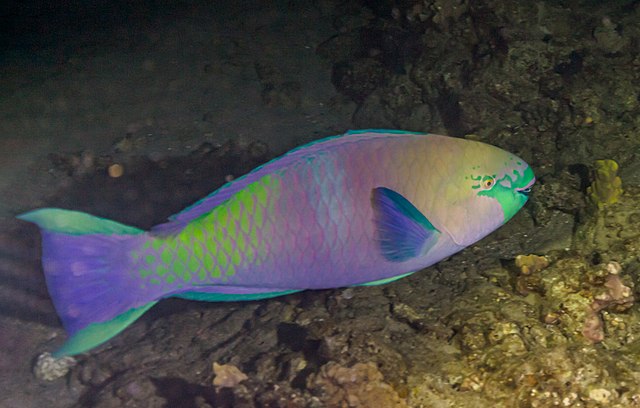Loading AI tools
Species of fish From Wikipedia, the free encyclopedia
The rusty parrotfish (Scarus ferrugineus) is a species of marine ray-finned fish, a parrotfish belonging to the family Scaridae. It is associated with reefs in the north western Indian Ocean and the Red Sea.
| Rusty parrotfish | |
|---|---|
 | |
| Terminal phase | |
| Scientific classification | |
| Domain: | Eukaryota |
| Kingdom: | Animalia |
| Phylum: | Chordata |
| Class: | Actinopterygii |
| Order: | Labriformes |
| Family: | Scaridae |
| Genus: | Scarus |
| Species: | S. ferrugineus |
| Binomial name | |
| Scarus ferrugineus Forsskål, 1775 | |
| Synonyms[2] | |
|
List
| |
This reef-associated species can be found on coral reefs at a depth of 1 – 60 m in the Red Sea, the Gulf of Aden, and the Persian Gulf where it is found off the coasts of Bahrain, Djibouti, Egypt, Eritrea, Yemen, Jordan, Iran, Qatar, United Arab Emirates, Oman, Saudi Arabia, Somalia and Sudan, as well as off Socotra. [1] It is generally common. [2]


Scarus ferrugineus measures up to 41 cm (16 in) in length.[2] Two colour patterns may be distinguished. [3] While the terminal phase is multicoloured, bright in colour, mostly blue-green, the initial phase, in which frequently these fishes are seen in groups, is brownish (hence the common name) with light and dark bands and a yellow tail.[3]
These fishes can be seen from March to November.[4] They are oviparous and protogynous hermaphrodites.
Three life phases can be distinguished, the juveniles, the adults of the initial phase (mostly females), and the adult males on the terminal phase (derived from females through sex and colour change). [3]
Individuals in the terminal phase form harems. They feed mainly on benthic algae. [2][5]
The rusty parrotfish was first formally described as Scarus ferrugineus in 1775 by the Swedish naturalist, explorer and orientalist Peter Forsskål (1732–1763) with the type locality given as Dahab on the northwestern coast of the Gulf of Aqaba off the Sinai Peninsula in Egypt.[6]
The rusty parrotfish is a quarry species for artisanal fisheries within its range.[1]
Seamless Wikipedia browsing. On steroids.
Every time you click a link to Wikipedia, Wiktionary or Wikiquote in your browser's search results, it will show the modern Wikiwand interface.
Wikiwand extension is a five stars, simple, with minimum permission required to keep your browsing private, safe and transparent.